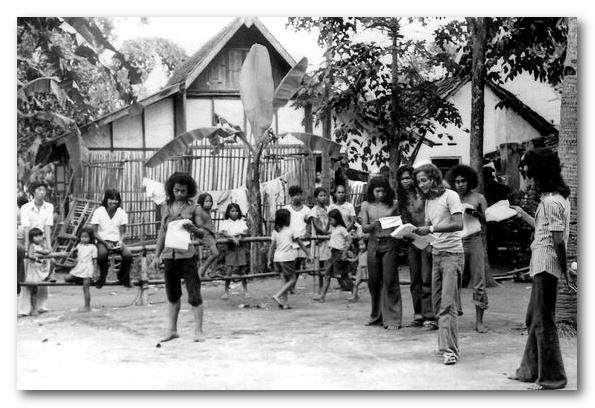Barbara Hatley
Rendra (wearing white T-shirt) and other members of Bengkel Theatre in 1976 rehearsing outside Rendra’s home in
|
On Thursday 6 August W.S. Rendra, the renowned dramatist and poet, famed for his flamboyant, strutting ways as well as his huge literary talent and bold, anti-authoritarian political positions, passed away in Jakarta.
Rendra was a controversial figure, and opinions differed about some of his political and personal choices. But no-one who ever saw him perform in a play or read his poetry could doubt his amazing acting talent and magnetic personal charisma. No-one who knew the arts scene in Yogyakarta in the 1970s when his Bengkel theatre was active there could deny the centrality of his presence to the cultural life of the city. The impact of his model of theatre, politically-critical and closely tied to its social and cultural context, has been enormous, shaping the course of modern Indonesian theatre until today. His poetry too, from the early free-flowing ballads to the extended political reflections of later years, presented a distinctive and powerful voice that was influential for many.
Born in 1935 in Solo, from 1955 to the early 1960s Rendra attended Gadjah Mada University in Yogyakarta. In 1964 he was awarded a scholarship from the American Academy of Dramatic Art and spent three years studying in the USA. When he first returned to Indonesia in 1967 he performed to startled audiences abstract, non-linear, virtually wordless dramas, termed mini kata, Indonesian responses to the Western avant garde theatre of the time. Then he settled into the pattern of play writing and theatre production which was to become his trademark, an eclectic mix of regional cultural traditions with influences from foreign sources.
First there were Javanese-style adaptations of Western classics, then original plays in which settings and dramatic styles become more and more explicitly Javanese/Indonesian, and the references to corrupt powerholders and social injustice clearly locally-based. After 1974 a government ban put a stop to Bengkel’s performances in Yogyakarta, although their outdoor rehearsals for shows in other cities drew keen audiences. On two occasions when the prohibition was lifted, first in 1977 for a performance of Sekda (The Regional Secretary) and then again in 1978 for Kisah Perjuangan Suku Naga (The Struggle of the Naga Tribe), huge crowds of students and other youthful supporters roared with approval at each perceived jibe at state authority. Similar reactions from enthusiastic youthful crowds greeted Rendra’s readings of the poetry he was producing at this time, the savage portraits of greedy decadent leaders, confused, corrupted youth and suffering poor he called ’pamphlet poems’ sajak-sajak pamphlet. Rendra was giving voice to the shared sense of anger of young people who had vigorously supported the rise to power of the New Order but now felt betrayed by its corruption, repression and perceived lack of concern with social justice.
Huge crowds of students and other youthful supporters roared with approval at each perceived jibe at state authority
In mid-1978, after a bomb exploded during one his poetry readings at the Taman Ismail Marzuki Arts Centre in Jakarta., Rendra was arrested and imprisoned for several months on the grounds that his activities threatened public order. After his release he was banned from public performance for seven years. When he re-established his Bengkel theatre as Bengkel Teater Rendra, in Depok on the outskirts of Jakarta in 1985, it operated on different lines and in a very different social environment to the original Bengkel theatre in Yogya.
During the 1980s and 1990s Bengkel staged several large-scale performances and Rendra continued to hold dramatic, sell-out poetry readings. Over the last decade or so however, Bengkel Theatre has been more important for its support for other artists, providing a venue where young artists or smaller groups from the regions have been given the opportunity to perform their work. Rendra himself moved more into the role of grand old man of the literary world than the young iconoclast of earlier years. Yet it is the younger Rendra who will be remembered, the daring artist taking on Suharto and the military in his poems and plays, speaking out for a generation who felt silenced by their social and political circumstances.
His passing, along with that of Pramudya Ananta Toer three years ago, a completely different kind of artist but similarly larger than life, feels like the end of an era in both modern Indonesian culture and wider Indonesian history. During the long years of the New Order regime, Rendra kept up a spirit of cultural and political resistance that inspired a generation. For that alone he is assured of the honour and gratitude of those who come after him. ii
Barbara Hatley (Barbara.Hatley@utas.edu.au) is Professor Emeritus in the School of Asian Languages and Studies at the University of Tasmania, and author of Javanese Performances on an Indonesian Stage (NUS Press 2008).
Image taken from Javanese Performances on an Indonesian Stage . Reproduced with permission.
II Related article
Rendra speaks, Suzan Piper. an interview with Rendra when he toured Australia in 2005.
